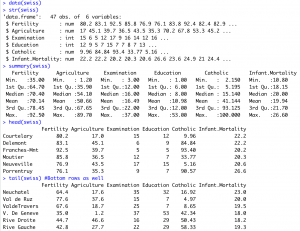Difference between revisions of "An initial path towards statistical analysis"
| Line 15: | Line 15: | ||
=[[#Univariate statistics| Univariate statistics]]<br> = | =[[#Univariate statistics| Univariate statistics]]<br> = | ||
| − | <div id=" | + | <div id="No, my variables have clear dependencies!">No, my variables have clear dependencies!</div><br> |
''Does you data contain at least one [[Data_formats#Categorical_data|categorical]] variable?'' <br> | ''Does you data contain at least one [[Data_formats#Categorical_data|categorical]] variable?'' <br> | ||
[[#Categorical and continuous data|Yes, I have at least one categorical independent variable! (?)]]<br> | [[#Categorical and continuous data|Yes, I have at least one categorical independent variable! (?)]]<br> | ||
Revision as of 19:40, 25 January 2021
Start here with your data! This is your first question.
Do you have several continuous variables without clear dependencies? (?)
Yes, I have several continuous variables without clear dependencies!
No, my variables have clear dependencies!
R commands: str, summary, head, tail
Example: Inspecting the swiss dataset
Contents
Univariate statistics
Does you data contain at least one categorical variable?
Yes, I have at least one categorical independent variable! (?)
R commands: str, summary, head, tail, ordered(dataset$variablename, c(levels = “level1”, level2”...))
Relevant figures: hist(), boxplot()
Categorical variables
Chi-Square test
R commands: table, chisq.test( x, correct=TRUE)
Relevant figures: (stacked) bar charts : barplot(), pie()
Categorical and continuous data
R commands: quantile(), str, summary,
Relevant figures:
Does your data consist only of categorical variables?
R commands: str, summary, table
Relevant figures: bipartite
Does you categorical dependent variables have 1-2 factor levels?
t-test
R commands: t.test, t_test Relevant figures:
Does you categorical dependent variables have more than 2 factor levels?
Analysis of Variance
R commands: aov, Anova, ezAnova, var.test(), lm
Relevant figures: boxplot()
R commands: ks.test
Dependent variable normally distributed
Type II Anova
R commands: aov, lm
Relevant figures: boxplot
Dependent variable not normally distributed
Dependent variable is count data
R commands: glm,
Relevant figures: plot
Dependent variable is 0/1 or proportions
R commands:
Relevant figures:
Type III Anova
R commands: Anova(car)
Relevant figures: boxplot
Dependent variable not normally distributed
Dependent variable is count data
R commands: glm
Relevant figures: plot
Dependent variable is 0/1 or proportions
R commands: glm
Relevant figures:
Are there random factor variables?
Random factors
R commands: glmer, glmmPQL
Relevant figures:
No, I have only continuous variables! (?) (?)
Continuous variables
Non dependent relations?
Correlations
Clear dependent relations
Regression models
Dependent variable normally distributed
Linear Regression
Dependent variable not normally distributed
Generalised linear model
Dependent variable is count data
Dependent variable is 0/1 or proportions
R commands:
Relevant figures:
Multivariate statistics
R commands:
Relevant figures:
Data is classified into groups
R commands:
Relevant figures:
CLuster analysis
R commands:
Relevant figures:
Supervised classification
R commands:
Relevant figures:
Unsupervised classification
R commands:
Relevant figures:
Network analysis
R commands:
Relevant figures:
Bipartite
R commands: is_bipartite(graph)
Relevant figures: make_bipartite_graph(types, edges, directed = FALSE)
Tripartite
R commands:
Relevant figures:
Ordinations
R commands:
Relevant figures:
Linear based ordinations
R commands:
Relevant figures:
Correspondance analysis
R commands:
Relevant figures:
Is your dependent variable normally distributed?
Is your dependent variable not normally distributed?
Does your independent variable contain only 1 or 2 groups?
Does your independent variable contain more than 2 groups?
Is your dependent variable normally distributed?
Is your dependent variable not normally distributed?
Resterampe
[[At least one continuous and one categorical variable|
More than 2 groups
Analysis of Variance
Dependent variable normally distributed
INSERT TYPE II
INSERT RANDOM FACTOR
INSERT LMM
Dependent variable not normally distributed
Dependent variable is count data
Dependent variable is 0/1 or proportions
